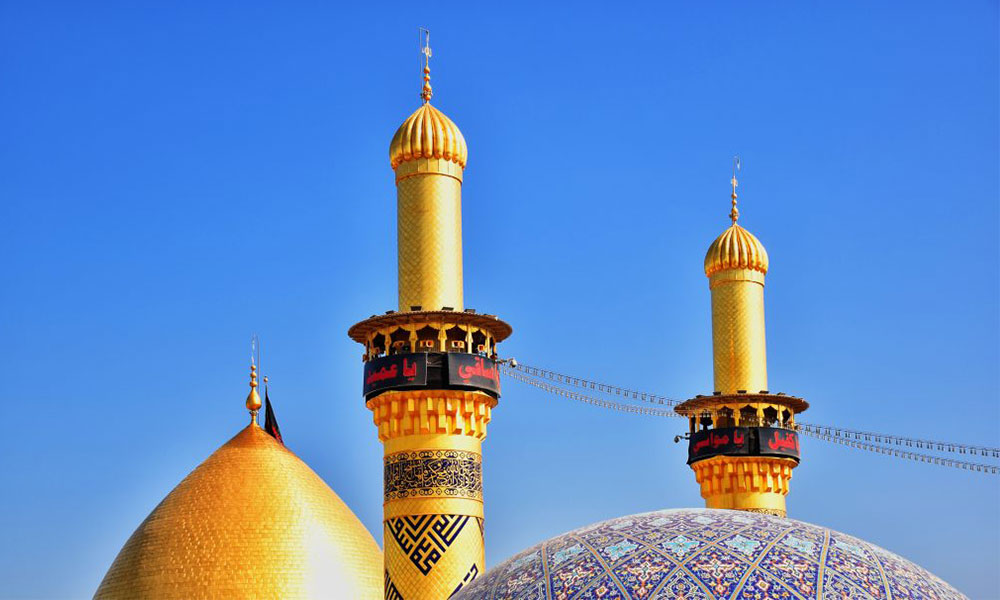(Iraq in the Bible - Part 1 | Part 2)
Consider two things. First, next to Israel, Iraq is the nation most often mentioned in the Bible. Second, today's newspapers are filled with articles about Iraq because of current world events. Considering the significance of Iraq in the history of Israel can only make us wonder what God has planned for this country today and in the future.
Iraq is not the name used by the writers of the Bible. Here, it is called Babylon, Mesopotamia, and the Land of Shinar. The name Iraq itself means "country with deep roots." Mesopotamia means "between two rivers," more specifically between the Tigris and Euphrates.
Iraq is mentioned in the first pages of the Bible.
The Scripture: Genesis 2:8
"Now the Lord God had planted a garden in the east, in Eden."
1. What did the Lord do?
2. Where was the garden?
We know today that Eden was in Iraq.
The Scripture: Genesis 2:7, 15
"The Lord God formed the man from the dust of the ground and breathed into his nostrils the breath of life, and the man became a living being....The Lord God took the man and put him in the Garden of Eden to work it and take care of it."
3. What did God do?
4. What was man to do?
The Scripture: Genesis 2:9
"In the middle of the garden were the tree of life and the tree of the knowledge of good and evil."
5. What two trees did God plant in the middle of the garden?
The Scripture: Genesis 2:16, 17
"The Lord God commanded the man, "'You are free to eat from any tree in the garden, but you must not eat from the tree of the knowledge of good and evil, for when you eat from it, you will surely die.'"
6. What were God's commands concerning the trees?
There was another occupant of the garden.
The Scripture: Genesis 3:1
"Now the serpent was more crafty than any of the wild animals the Lord had made."
7. Who is this other occupant?
8. How is he described?
The Scripture: Genesis 3:4
"'You will not surely die,' the serpent said to the woman. 'For God knows that when you eat of it your eyes will be opened and you will be like God, knowing good and evil."
9. What did the serpent promise Eve?
We know that Adam and Eve believed Satan's lie. They did not trust God and disobeyed His command by eating the forbidden fruit. For their disobedience, God banished them from their beautiful home and they reaped the consequences of their sin: a life of hard work, pain, and eventual physical death.
The deeds of the people on earth became more and more evil.
The Scripture: Genesis 6:5-6
"The Lord saw how great man's wickedness on the earth had become, and that every inclination of the thoughts of his heart was only evil all the time. The Lord was grieved that he had made man on the earth and his heart was filled with pain. So the Lord said, 'I will wipe mankind, whom I have created, from the face of the earth...for I am grieved that I have made them.' But Noah found favor in the eyes of the Lord."
10. What was man's condition?
11. Why was the Lord grieved?
The Scripture: Genesis 6:7
"The Lord said, 'I will wipe mankind, whom I have created, from the face of the earth - men and animals, and creatures that move along the ground, and birds of the air.' "
12. What did the Lord decide to do?
The Scripture: Genesis 6:8
"But Noah found favor in the eyes of the Lord."
13. Who found favor with the Lord?
The Scripture: Genesis 6:9
"Noah was a righteous man, blameless among the people of his time, and he walked with God."
14. What do we learn about Noah?
The people on earth became more and more evil.
The Scripture: Genesis 5:32
"After Noah was 500 years old, he became the father of Shem, Ham and Japheth."
15. Who were Noah's sons?
The Scripture: Genesis 6:14
"Make yourself an ark."
16. What were the Lord's instructions to Noah?
God gave Noah very specific instructions about the building of the ark.
The Scripture: Genesis 6:19, 21
"You are to bring into the ark two of all living creatures, male and female...You are to take every kind of food that is to be eaten and store it away as food for you and for them."
17. What further instructions did God give Noah?
The Scripture: Genesis 6:22
"Noah did everything just as God commanded him."
18. What did Noah do?
The Scripture: Genesis 7:11-12
"In the six hundredth year of Noah's life...all the springs of the great deep burst forth, and the floodgates of the heavens were opened. And the rain fell on the earth forty days and forty nights."
19. When did the rain begin to fall?
The Scripture: Genesis 7:13
"Noah and his sons...together with his wife and the wives of his three sons, entered the ark."
20. Who entered the ark with Noah?
The Scripture: Genesis 7:14-16
"They had with them every wild animal according to its kind...every creature that moves along the ground...everything with wings...The animals going in were male and female of every living thing. Then the Lord shut him in."
21. What else entered the ark?
22. What did the Lord do next?
The Scripture: Genesis 7:17
"For forty days the flood kept coming on the earth…”
23. How long did it continue to rain?
The Scripture: Genesis 7:21-23
“Every living thing that moved on the earth perished—birds, livestock, wild animals, all the creatures that swarm over the earth, and all mankind. Everything on dry land that had the breath of life in its nostrils died. Every living thing on the face of the earth was wiped out; men and animals and the creatures that move along the ground and the birds of the air were wiped from the earth. Only Noah was left, and those with him in the ark.”
24. What died in the flood?
25. Who survived?
The Scripture: Genesis 7:24
"The waters flooded the earth for a hundred and fifty days."
26. How long did the flood last?
Note: Noah built the ark in Iraq.
We know that even after these horrendous events, the descendants of Noah continued to be wicked. Cush, the son of Noah was the father of Nimrod, a mighty hunter and warrior. The center of his kingdom was Babylon, which was also in Iraq. As time passed, his and Noah's other descendants spread out over the earth. They had one language and a common speech.
The Scripture: Genesis 11:4
"They (the residents) said, 'Come, let us build a city, with a tower that reaches to the heavens, so that we may make a name for ourselves and not be scattered over the face of the whole earth."
27. What did they decide to do?
The Scripture: Genesis 11:6-7
"The Lord said, 'If as one people speaking the same language they have begun to do this, then nothing they plan to do will be impossible for them. Come let Us go down and confuse their language so they will not understand each other.”
28. What did the Lord realize?
29. What did He decide to do?
The Scripture: Genesis 11:8
"So the Lord scattered them from there over all the earth and they stopped building the city."
30. What did the Lord do?
The Scripture: Genesis 11:9
"That is why it was called Babel - because there the Lord confused the language of the whole world.”
31. What was the city called?
32. Why?
We know today that Babel was in Iraq.
In the second part of this study, we will continue to follow the part Iraq has played in biblical history.
(Iraq in the Bible - Part 1 | Part 2)
The Answers
- He planted a garden.
- In the east, in Eden
- He formed the man and placed him in the Garden.
- Work the garden and take care of it
- The tree of life and the tree of the knowledge of good and evil
- That the man was free to eat from any tree in the garden, except the tree of the knowledge of good and evil.
- The serpent
- As more crafty than any of the wild animals the Lord had made
- That when she and Adam ate from the tree, they would be like God, knowing good and evil
- Every inclination of his heart was evil.
- Because He had made man
- To wipe mankind and all the birds and animals from the face of the earth
- Noah
- He was a righteous and blameless man who walked with the Lord.
- Shem, Ham and Japheth
- To make an ark
- To bring two of all living creatures and every kind of food into the ark
- Everything the Lord commanded him
- In the six hundredth year of Noah's life
- His wife and his sons and their wives
- Every wild animal, everything that moved along the ground and everything with wings, male, and female
- He shut them in.
- Forty days
- All the animals and birds
- Only Noah and those who were with him
- A hundred and fifty days
- Make a tower that reached to the heavens so they could make a name for themselves and not be scattered over the face of the whole earth
- That if the people speaking the same language could build such a tower, nothing would be impossible to them
- Confuse their language so they wouldn't understand each other
- He scattered them over the earth
- Babel
- Because it was there that the Lord confused the language of the whole world
All scripture quotations in this publication are from the Holy Bible, New International Version
(unless otherwise indicated)
Copyright © 1973, 1978, 1984, New International Bible Society
Copyright © 2005 by JoAnne Sekowsky





